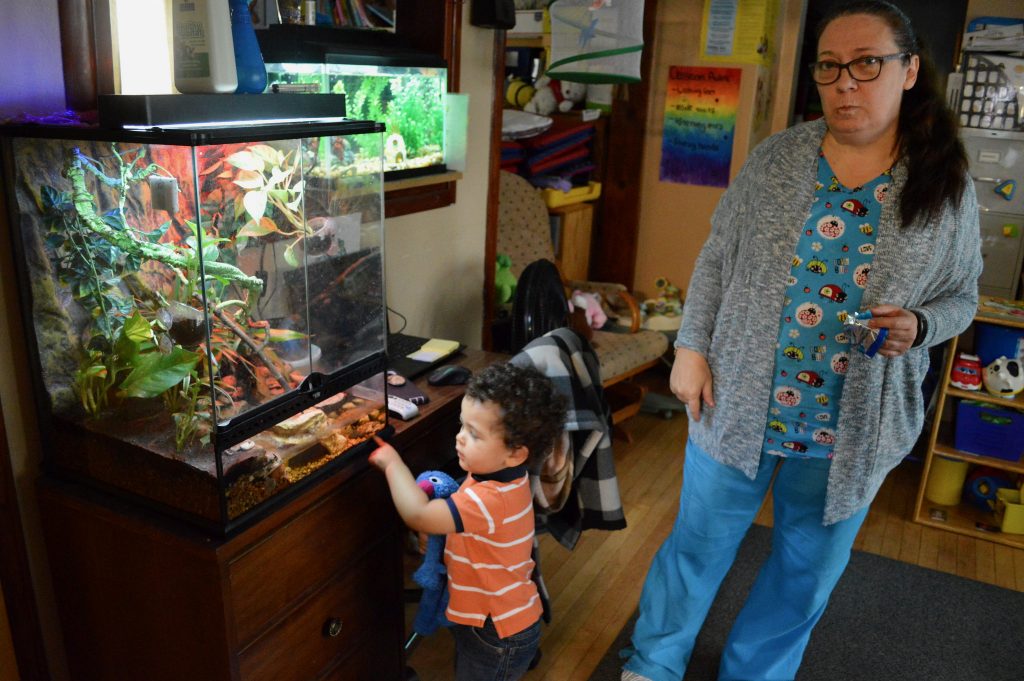Trouble Finding Affordable Child Care? Here’s Why.
76% of early childhood education centers in Wisconsin have reported a staffing shortage.

Affordable child care is hard to come by these days, and new data suggests staffing shortages may be partially to blame. Here, Barbara Kelley, owner of Mama Bear’s Family Child Care, looks on while Joseph Carey watches lizards in 2018. File photo by Analise Pruni/NNS.
If you have had trouble finding affordable child care, especially since the COVID-19 pandemic began in March 2020, you are not alone. New data suggests a staffing shortage may be partly to blame.
According to the National Association for the Education of Young Children, or NAEYC, 78% of early childhood education centers reported experiencing staffing challenges. This has led to fewer available spots for children, longer wait lists for parents and a corps of burned-out providers.
Providers in Milwaukee say the biggest reason why they are short-staffed is because it is difficult to offer competitive wages in an industry with margins that are already tight.
In the same NAEYC survey, 76% of respondents said their staff received increases in compensation through bonuses or baseline pay. At the same time, 21% of early childhood educators working in centers and family child care homes are worried about being cut off from public benefits like FoodShare or housing subsidies if their compensation increases.
Additionally, about 41% of surveyed providers in Milwaukee, including 44% of programs owned by people of color, said they would have closed during the pandemic if they had not received financial assistance from the state or philanthropic sources.
‘Four jobs in one’
Yimma Davila-Castro runs Yimma’s Bright Beginnings Daycare in the Polonia neighborhood. Hers is a small operation and is only licensed to take in eight children based on their age. Because of state rules, she is not able to take more children under 2 years old unless she hires staff, which has been difficult.
“It’s like four jobs in one: accountant, teacher, cook, custodian,” Davila-Castro said, referring to the many roles her employees take on. “And you need to go through a background check, take classes, just to make less than you would at McDonald’s.”
“In order to pay someone $18 an hour, I need to charge two and half times what I charge now or more,” Davila-Castro said. “And the parents paying out of pocket are not rich. One paycheck already goes to child care and the other goes to bills.”
Tamara Johnson, the executive director of Malaika Early Learning Center in Harambee, said although it has never been easy to hire staff with the necessary qualifications, it’s harder now.
“The pipeline is slim for educators with the required skill set. It is increasingly difficult for folks to submit résumés,” she said, adding that what stops folks from applying is typically a combination of low pay, the risk of contracting COVID-19 and that the job is “hard work emotionally.”
Johnson said she would like to see investment in teacher prep programs such as the Milwaukee Teacher Education Center, or MTEC, and the Literacy Lab. She said doing so would help ensure a steady supply of qualified teachers to keep early childhood education centers enrolling closer to their licensed capacity.
‘I don’t feel like that’s a working society’
In the meantime, though, it is often parents looking for child care on a limited budget who are stuck with the consequences of low staffing.
Sharimah Negrón, a nurse, needed to find child care for her 8-year-old daughter while she was learning remotely last year.
Every provider she called was full, except for one that was too expensive.
Negrón was able to switch her work schedule around in order to be home when needed, but said she would have had to consider quitting her job in order to be with her kids if things hadn’t worked out.
“Sometimes it’s more affordable to just have a parent stay home than to spend half your paycheck for child care,” Negrón said.
“You’re left with making the decision about whether to have a family or not, and I don’t feel like that’s a working society.”
Trouble finding child care? You’re not alone, and here’s why. was originally published by the Milwaukee Neighborhood News Service.





















